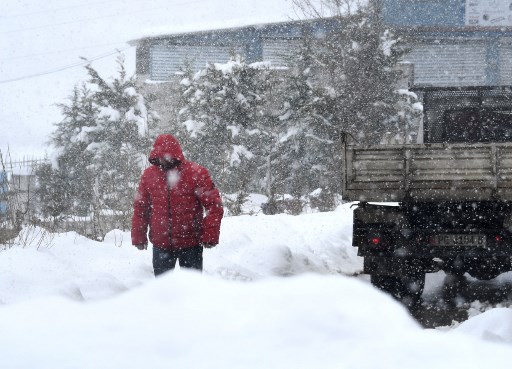
A blast of Siberian weather sent temperatures plunging across much of Europe on February 27, carpeting palm-lined beaches in snow and prompting warnings for the homeless and elderly people. / AFP PHOTO / Gent SHKULLAKU
(Eagle News) – The World Health Organization warned that the wave of extremely cold weather now affecting Europe this week posed “health risks” as the number of deaths due to the deadly blizzards in the region rose to more than 55.
A news release from WHO said that the temperatures are even “expected to plunge below average in western European Russia, central Europe, the Balkans and the Baltic States.”
This means that the death toll could even go higher if the extreme weather conditions continue.
“Cold, even in places where the temperatures are not at their lowest, can be harmful to people’s health in many ways. It can aggravate existing conditions and raise the risk of increased blood pressure, heart attacks and strokes,” said Dr. Zsuzsanna Jakab, WHO Regional Director for Europe.
Jakab said that taking preventive action can help reduce the health impacts and risks in the areas affected.
The death toll Europe-wide climbed to more than 55, as another three people perished in Poland, taking the number of victims there to 21, most of them rough sleepers.
But this February alone, the deaths in Poland due to the hypothermia were at least 29, most of them occurring in the past five days.
According to a report from the Agence France Presse quoting the Medical Rescue Service, in Slovakia, exposure to the cold has claimed the lives of seven people since Sunday.
There have also been six deaths in the Czech Republic in recent days, five in Lithuania, four in France, three in Spain, two each in Italy, Serbia, Romania and Slovenia, and one each in Britain and the Netherlands.
One of the Spanish victims was a 39-year-old homeless man who had been sleeping in an abandoned truck.
Jakab said that WHO is carefully following the situation in countries of the European Region.
“Affected countries should stay alert. Measures must be taken to protect people at risk,” he warned.
WHO said that the poor and vulnerable are at the “highest risk of cold-related illnesses.”
It said that the cold weather increased the risk of cardiovascular and respiratory diseases.
Those most at risk “include elderly people, children, and people who have chronic diseases or physical or mental limitations,” it said.
“People taking certain medications or those who are malnourished are also at greater risk of cold-related illnesses,” WHO added.
(With a report from Agence France Presse)








